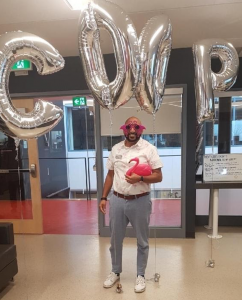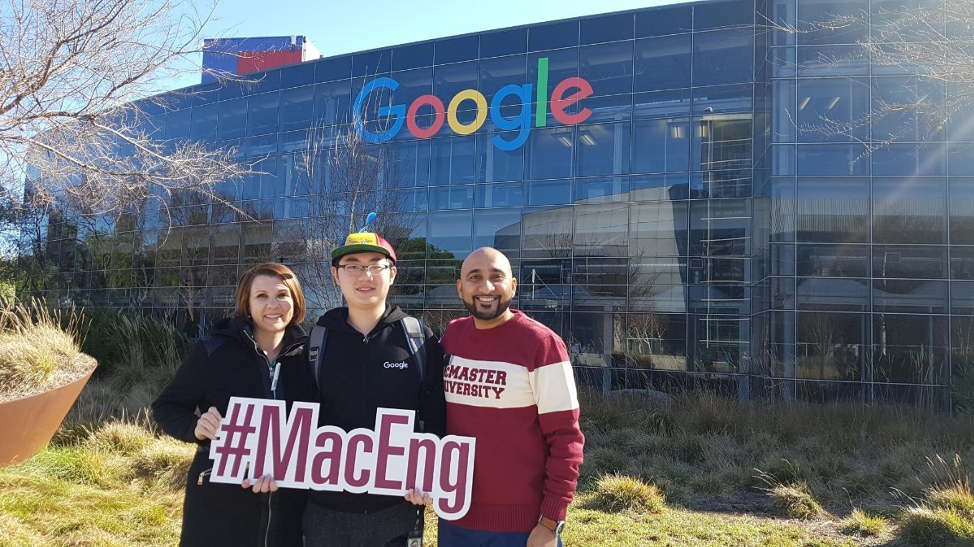Career educators and coaches play a vital part in the success of developing future talent. This support doesn’t end once students finish their degrees – career educators continue to assist students in their school-to-work transition, and this benefits not only students but also employers. Though, it’s important for employers to be involved in career planning as well. From employer branding, showcasing workplace culture, holding events, managing campus ambassadors to connecting with students before they even start their first day can have a great impact. We explored this topic with Jesse Sahota, Career Development Relationship Manager in the Engineering Co-op and Career Services office at McMaster University, who also won Career Educator of the Year at the 2019 TalentEgg Awards. Read on to learn how Jesse supports his students, fosters relationships with employers and his advice on ways employers can connect with students to assist in their school-to-work transition.
Starting His Career with Purpose
 When Jesse first envisioned his career, he believed he was going to work in the advertising industry one day, “designing commercials for Audi or working for Kellogg’s redesigning their Fruit Loops cereal boxes,” he says. During his final year at university, he landed a job in a wealth management firm as a recruiter, which eventually led him to his passion for helping others find their careers. And what a long and meaningful career it has been for Jesse so far! With over 15 years of experience in Career Coaching and Education, Jesse’s current role is comprised of three pillars that facilitate student success. He works to pursue new business development leads while maintaining existing partnerships in the engineering and business communities. The second pillar is coaching students using personalized strategies. “Pain points differ depending on where the student is at in their recruitment life cycle,” Jesse says. Whether students come with generic resumes and cover letters, or are looking to get more involved on campus, Jesse helps them on their career journey. Finally, the third pillar to Jesse’s role is collaborating with employers who are looking to create a stronger brand on campus.
When Jesse first envisioned his career, he believed he was going to work in the advertising industry one day, “designing commercials for Audi or working for Kellogg’s redesigning their Fruit Loops cereal boxes,” he says. During his final year at university, he landed a job in a wealth management firm as a recruiter, which eventually led him to his passion for helping others find their careers. And what a long and meaningful career it has been for Jesse so far! With over 15 years of experience in Career Coaching and Education, Jesse’s current role is comprised of three pillars that facilitate student success. He works to pursue new business development leads while maintaining existing partnerships in the engineering and business communities. The second pillar is coaching students using personalized strategies. “Pain points differ depending on where the student is at in their recruitment life cycle,” Jesse says. Whether students come with generic resumes and cover letters, or are looking to get more involved on campus, Jesse helps them on their career journey. Finally, the third pillar to Jesse’s role is collaborating with employers who are looking to create a stronger brand on campus.
“Our department’s “Employer of the Week” series brings employers to campus where I assist in orchestrating events, such as employers in the lobby, resume roasts, bus trips, Instagram takeovers and lunch and learn workshops.”
Supporting Students on their Career Journey
Jesse’s department supports students through a variety of workshops and individual appointments to prep them before the start of their co-op work term. “In Engineering Co-op and Career Services at McMaster University, the transition from the classroom to the shop floor or boardroom is exceptionally smooth,” he comments.
“Having been in this industry and in my current role for so long, I’ve had the opportunity to meet many of our employer partners on-site. These meetings give me the opportunity to provide a unique perspective and “inside scoop” when coaching students on what to expect at their new job.”
One of the most memorable career highlights was taking five students to Silicon Valley in San Francisco for their Big Ideas Contest. Students were given the opportunity to learn from top innovators and develop their professional skills. Five students, management staff and the Dean of Engineering visited Tesla, Apple, Google, Facebook, Corning and several start-ups during their trip. This is a great example of how Career Educators are creating experiences for their students to showcase their innovative engineering solutions, build invaluable networking opportunities and learn about the possibilities. While Jesse and his team created this opportunity for students to learn, he ended up taking away a lot for himself too.
“It was an eye-opening experience for me as it provided the opportunity to connect with McMaster Engineering alumni and further solidified my understanding that our graduates are changing the world.”
What Can Employers Do for Students?
While career educators help to set students up for success in launching their careers, Jesse shares some ways in which employers can make students feel welcome and valued before they even start working. Jesse comments that not only will this showcase the organizations’ culture, but it will also prepare students for the road ahead. Reaching out to students after they’ve accepted their offer, even if it’s well in advance of their start date, can have a positive impact.
“A welcome email with details regarding what to expect on their first day is a great way to get the student excited about their new adventure by winning their heart and mind. Many organizations are taking onboarding seriously by allocating a personal mentor to each new hire – a strategy that I find highly effective.”
Another way Jesse suggests employers get involved in students’ transition is during the offer stage.
“When employers present an offer to a student, I would suggest that they invite the student to their site, provide them with a tour of their facility, introduce the student to a mentor, connect them with the current student(s) that are working there, and take them out for lunch or coffee. This approach is an excellent way to strengthen the student’s commitment to the employer’s brand. It’s a win-win strategy.”
Build Your Brand Recognition – Get on Campus!
P roviding the opportunity for students to connect with employers in-person is always a great strategy when it comes to recruiting the right talent and finding the best candidates to fill your talent pipeline.
roviding the opportunity for students to connect with employers in-person is always a great strategy when it comes to recruiting the right talent and finding the best candidates to fill your talent pipeline.
“Employers are encouraged to come to campus and meet our students, run workshops, attend hackathons, partner with student groups and, ultimately, connect with career offices on campus. Getting in front of students and answering their questions in-person establishes a connection, builds stronger brand recognition, and these students can then become brand ambassadors for employers by telling their friends what they’ve learned.”
Whether you’re an employer looking to connect with and hire students or you’re a fellow Career Educator, you can learn from Jesse’s unique approach. “My career is something that I truly enjoy and I love knowing that I have had a hand in helping someone else find their dream job or career.”
Get in Touch
905-525-9140 ext 24432
https://www.linkedin.com/in/jesse-sahota/

